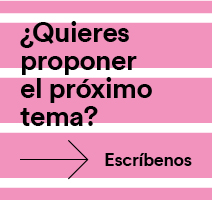Give your opinion
To oppose the dominance of the ephemeral. To form a critical citizenry, capable of escaping the dialectics and superficiality of empty discourse. To conquer freedom through a disciplined love of truth and an exercise in self-criticism. That, if nothing else, is what Philosophy is all about.

Ana Marta González. Professor of Philosophy at the University of Navarra, member of the Pontifical Academy of Social Sciences. D. in Philosophy with award extraordinary in 1998, with a thesis on Thomas Aquinas, she was a Fulbright Scholar at department of Philosophy at Harvard University (2002-2003), where she extended her research to the relationship between morality, nature and culture in the Kantian Philosophy internship . scholarship Salvador de Madariaga (2015) at the same academic centre. She has made several stays at research at the University of Münster (Germany), and Catholic University of America (Washington, D. C., USA), with a scholarship from the Ministry of Education. |

Philosophy against the dominance of the trivial
Those who oppose life and reason tend to forget that, far from being an inert School , reason has interests, and that it is precisely these interests that give human life its most characteristic dimension and importance.
Kant Kant concentrated them around three fundamental questions: what can I know, what must I do, what can I hope for, which he considered could be summed up in a fourth question: what is man? Although these questions ultimately concern every human being, it is the activity we call Philosophy that is proper to the rigorous investigation of these questions.
Distinguishing the important from the unimportant
is for many the task of a lifetime.
That even in a pragmatic and short-sighted civilisation such as ours, Philosophy still occupies a place on Education can be considered, at worst, an inertia of educational systems; at best, a conscious commitment to the only exercise of reason that can cope with the "domain of the trivial" that today characterises public opinion, where the most unimportant issues coexist and replace with the greatest speed others that perhaps deserve more careful consideration. Distinguishing the important from the unimportant is for many the task of a lifetime. The survival of the Philosophy, beyond the orientation that each philosopher gives to his reflections, is in itself a reminder, particularly necessary today, that human life cannot be considered a simple function of survival; a sign that reason is not satisfied with vain dialectical exercises, in the service of interests other than truth. The degree scroll of this article evokes a book recently published by my colleagues Lourdes Flamarique y Claudia CarbonellThe post-truth, or the domain of the trivial, which, taking its cue from discussion on post-truth, which surfaced with virulence almost three years ago, openly raises the question of truth, which is, at final, the great interest of the Philosophy.
Naturally, there are truths and truths. Everyone, the philosopher, the scientist, the artist... pursues the truth of their own field, just as we all pursue, with greater or lesser success, that truth which Aristotle once called "truth internship", the truth of action and, ultimately, the truth of life. However, the truths whose absence unleashed alarm in broad sectors of society, to the point of turning the term "post-truth" into a talking shop topic for a "whopping" several months, are humble factual truths: those which, wrapped in more or less persuasive rhetoric, have relevance for political life: did or did not such a thing happen? Did candidate tell the truth? Was he wrong or did he deliberately lie?
The populist speech is a deeply emotional reaction
deeply emotional reaction to the speech
aseptic of a politically correct technocracy.
In this context, what the term 'post-truth' was intended to highlight is the frightening nature of a cultural state marked by an apparent disregard for truth, in which it no longer matters so much what you said as how you said it. Undoubtedly, as he notedAristotle in his Rhetoric, for an effective speech it is not just the argument that is enough, but the ability to reach the audience, the appearance of integrity... The problem arises when attention is directed almost exclusively to these aspects, to extremes bordering on the ridiculous, and in between the truth is sacrificed. Because, as I argued Hannah Arendt in a famous essay, this is lethal for the credibility of politics.
The populist speech constitutes a deeply emotional reaction to the aseptic speech of a politically correct technocracy. But both sacrifice truth and end up resorting to similar rhetorical strategies to gain a place on the stage. Forming a critical citizenry, capable of escaping the dialectics and superficiality of empty discourse, requires more than rhetoric: it requires that class of freedom that can only be conquered through a disciplined love of truth and a demanding exercise of self-criticism in the face of the dominance of the ephemeral. That, if nothing else, is what Philosophy is all about.

BOOKS CITED:
Lourdes Flamarique y Claudia Carbonell The post-truth, or the domain of the trivial. BUY.
Aristotle, Rhetoric. BUY
Hannah Arendt Truth and Lies in Politics". BUY






